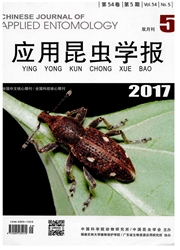

 中文摘要:
中文摘要:
【目的】为探讨淡足侧沟茧蜂Microplitis pallidipes Szepligeti调控寄主甜菜夜蛾Spodoptera exigua(Hübner)的生理机制。【方法】测定了淡足侧沟茧蜂寄生甜菜夜蛾后,寄主幼虫血淋巴中保护酶(SOD、CAT及POD)和免疫酶(PO和LSZ)活性的变化。【结果】寄生后连续5d观察时间内,从寄生后第1天开始,寄主幼虫血淋巴中SOD活性就高于未寄生幼虫(对照),且在寄生后第4~5天达到显著水平;被寄生幼虫血淋巴中CAT活性始终高于对照幼虫,且在寄生后第1、第4~5天达到显著水平;同样,甜菜夜蛾被寄生后,其血淋巴中POD活性明显高于对照幼虫,且在寄生后第1~2、第5天达显著水平;寄生后第1天,寄生与对照组酚氧化酶活性差异不显著,但寄生后第2~5天均达到显著水平;较对照组,寄生后第1~2天,被寄生幼虫溶菌酶活性增加但无显著差异,而寄生后3~4d溶菌酶活性显著降低。【结论】本研究揭示,淡足侧沟茧蜂寄生刺激了甜菜夜蛾幼虫体内的应激反应,诱导寄主体内SOD、CAT和POD活性明显上升,阻止寄生蜂成功寄生;同时,寄生蜂寄生诱导了寄主免疫酶(PO、LSZ)活性的变化,免疫酶活性的变化是寄主免疫系统对寄生蜂寄生的一种应急免疫反应。
 英文摘要:
英文摘要:
[Objectives] Spodoptera exigua (Hübner) (beet armyworm) is a global insect pest that feeds on various agricultural crops including vegetables, cotton, and ornamentals. The main methods to control S. exigua are using chemical pesticides which can negatively impact human health and the environment. Using biological control organisms such as Microplitis pallidipes Szepligeti can reduce pesticide applications. To investigate the physiological mechanism of the parasitization of S. exigua larva by the M. pallidipes by collecting hemolymph from parasitizated host larvae. [Methods] We examined the activities of immune and protective enzymes using a microplate reader. [Result] The results indicated that the activity of superoxide dismutase (SOD) in the hemolymph of larval S. exigua began to increase 1 day after parasitization (DAP) compared to the control with significant differences occurring 4-5 DAP. Catalase (CAT) activity in the hemolymphs were consistently higher in parasitized larvae compared to the control, significantly at 1, 4, and 5 DAP. Finally, peroxidase (POD)activity was also higher in parasitized larvae compared to the control, significantly at 1, 2, and 5 DAP. [Conclusion] These results suggest that excess reactive oxygen species (ROS) generated in host larvae were scavenged by SOD, POD and CAT impeding for more successful development of M. pallidipes in the host larvae. Simultaneously, Phenoloxidase (PO) activity was significantly lower in parasitized larvae after 1 DAP while lysozyme (LSZ) activity was significantly lower 3-4 DAP in the same treatment. Together, these results suggest that changes immune and protective enzyme and activities following parasitism are involved in S. exigua immune responses against parasitization, and provide insights into the physiological mechanisms of M. pallidipes regulation of host responses.
 同期刊论文项目
同期刊论文项目
 同项目期刊论文
同项目期刊论文
 The effect of oviposition experience of adult Microplitis pallidipes parasitoids on discrimination b
The effect of oviposition experience of adult Microplitis pallidipes parasitoids on discrimination b The impact of co-infection by a nucleopolyhedrovirus and theendoparasitoid Microplitis pallidipes on
The impact of co-infection by a nucleopolyhedrovirus and theendoparasitoid Microplitis pallidipes on Effect of nucleopolyhedrovirus infection of Spodoptera litura larvae on host discrimination by Micro
Effect of nucleopolyhedrovirus infection of Spodoptera litura larvae on host discrimination by Micro 期刊信息
期刊信息
